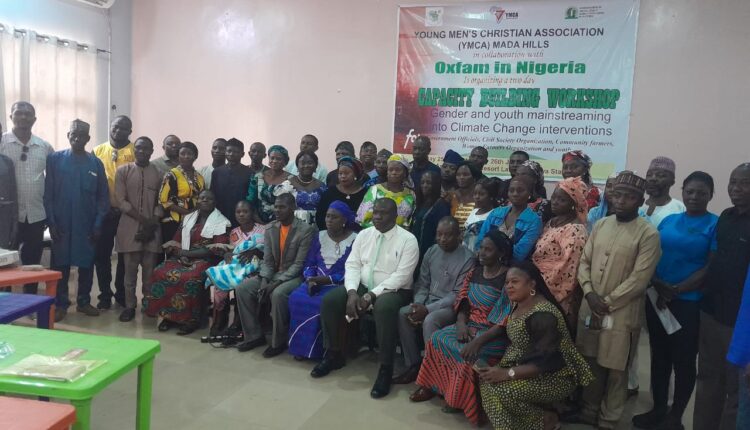Climate change: NGO advocates inclusion of gender-friendly policies in Nasarawa
|
Getting your Trinity Audio player ready...
|
By Linus Ogbu, Lafia
The Young Men’s Christian Association (YMCA), an NGO has advocated inclusion of gender friendly policies in the climate change mitigation strategies and interventions at all levels of government to give women and youths sense of belonging.
Mr Ango Adamu, Executive Secretary, YMCA Mada Hills made this appeal at a two day capacity building workshop for stakeholders on “Gender and Youth mainstreaming into climate change interventions” on Wednesday in Lafia.
Adamu explained that the workshop was organised by YMCA, Association of Small Scale Agro Production in Nigeria, in collaboration with Oxfam, through African Activists for Climate Justice project (AACJ).
He highlighted objectives of the workshop to include; helping participants to take gender and youth issues into account when designing climate change intervention packages and understanding how climate affects women and men differently.

According to him, women and men have different climate change adaptive and mitigative capabilities, hence government, institutions and climate change financing instruments take into account during planning, fund design and operationalization.
“In Nasarawa state and Nigeria of course, the basic means of livelihood for a larger population of people especially small scale women farmers depend on natural resources.
“And they do not have the capacity to respond to floods, drought, erosion, pests infestation, conflicts, health from pollution and other higher risks and greater burden caused by climate change.
“We are advocating for institutional support and deliberate inclusion of gender friendly policies that favour women, youths and people with disabilities, in climate change mitigation strategies of governments,” he said.
He said that YMCA and Oxfam was committed to supporting initiatives that promote inclusion of gender and youth issues in climate change decisions and implementation in Nasarawa state.
Also speaking, Kenneth Akpan, Project Coordinator for AACJ, said the training became necessary considering importance role women and youths played in the realisation of the project, noting that they were most affected by climate change impact.
He said AACJ project was designed to amplify the voices of the vulnerable particularly women, youths and people with disabilities, to make people understand the importance of mainstreaming gender, the narrative and the approach.
“For us here is importance that we are conscious, and want people to have that consciousness that they have to carry this set of people along, because we also know that norms and traditions are infringing on their rights to participate and also stifling their voices.
“We want to government to consciously design policies to accommodate them, meet their needs, and this can be reflected in the appointment, and their inclusion into governance, to also have their own say when it comes to climate change issues,” he said.
He listed climate change issues affecting women to include; erosion, flood, drought, land tenure
harsh wind, storm, pollution, health challenges, discrimination, underpaid work, under representation in decision-making and hardship caused by subsidy removal.
The workshop had in attendance 50 participants drawn from government ministries community farmers and women farmers organisations, youths and civil society organisations, people with disabilities among others.


